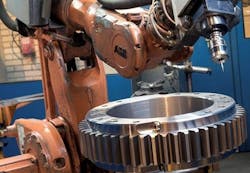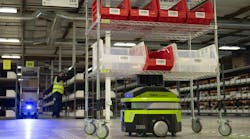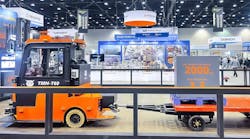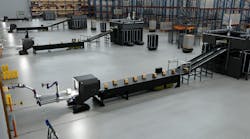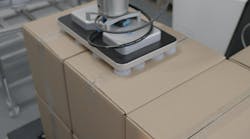Gear Manufacturer Achieves Consistent Quality with Automated Robot Cell
Renishaw, a precision engineering and manufacturing technologies company, has helped two major international organizations solve the problems associated with finishing and deburring precision gears.
Gear and gearbox manufacturer Katsa Oy commissioned Flexmill Oy to design and build a robotized cell to finish and deburr gears ranging in size from 2 inches to 5 feet in diameter. The custom, turnkey cell incorporates Renishaw RMP60 probes, mounted on custom-designed tool holders, which an ABB robot uses to collect vital part-location data before finishing and deburring operations commence.
Deburring gears manually using grinding wheels can be an unreliable process, resulting in inconsistent finishes across parts in the same batch. Machine shop operators have to be very skilled to achieve a quality and consistent finish, but even then, variations from one operator to another are unavoidable.
In addition, manual deburring is a dirty and hazardous job, which few operators at Katsa wanted to undertake. As a consequence, finishing and deburring operations became a bottleneck in the company’s manufacturing process, with a cumulative effect often causing significant delays.
According to Sami Niemelainen, Quality and Development Manager at Katsa, “The reason we invested in the robotic cell was not to make the job faster; the reasons were better quality and consistency. Also, the task of deburring is now cleaner and safer for our machine shop operators, and that’s very important. With any operator willing to take on deburring using the Flexmill robotized system with Renishaw’s RMP60 probe, delays have been eliminated and lead time is more consistent and predictable.”
To automate the gear deburring process, Flexmill built a cell incorporating an ABB robot, a Renishaw RMP60 probe and a twin pallet system that allows one gear to be machined while another is loaded.
To ensure all excess material on the machined gears is removed automatically by the deburring process, the Flexmill software requires the exact geometrical parameters of the gears and the gear teeth. Some of these parameters are known and available for each of the many different gears made by Katsa.
Those parameters that are not known can be measured using the Renishaw RMP60 probe with radio signal transmission. The ABB robot uses the probe for locating parts during set-up, with the resulting positional data used by the control software to generate a complete, automated deburring cycle – no manual programming required. Once machined, the RMP60 probe is used post-process to confirm finished dimensions.
The RMP60 probe is ideally suited to this application due to its robust and reliable frequency hopping spread spectrum (FHSS) protocol. This means that communication between the probe and its receiver remains stable even if, for example, ‘line-of-sight’ is lost or if another radio source enters the environment.
Mr. Niemelainen concluded, “The Renishaw RMP60 probe has been working very well and it makes it possible for the Flexmill software to generate a full deburring program for every one of the gears we manufacture. We only need to give some parameters to the control and the robot will use the Renishaw probe to create the program automatically. The result is that quality is always the same, each and every time we deburr a gear.”
